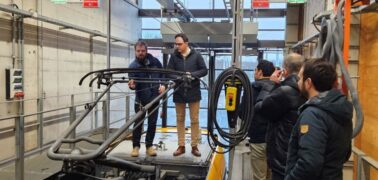Within CE4CE project Leipzig Transport Company (LVB), together with Kruch Railway Innovations and ATB MOBILITY S.P.A (ATB), a public transport provider from Bergamo, Italy, are developing and implementing a systemic solution in order to introduce predictive maintenance to infrastructure in Leipzig, one of the fastest growing German cities and thus in need of state-of-the-art transport services. It is all with an aim to turn from generally costly reactive and manual maintenance to much more economical and minimally invasive predictive and automated maintenance.
The LVB Group has extensive experience in the construction and maintenance of public transport infrastructures and it is intensively working on introducing digitalization processes intro daily operation in order to adopt greener and more sustainable working structures in their organization.
As for the currently implemented pilot, it has already been determined which types of assets and their sections (rails & catenary) will be used for this measure. First, prototype modules for predictive maintenance will be developed and they will be applied to some selected parts of infrastructure in order to roll out the methodology for predictive maintenance which in a further step could be deployed in the entire Leipzig transport network.
After conducting the procurement process, the infrastructure will be equipped with sensors. The evaluation of the data and testing of the algorithms will go parallel. Continuous exchange will be carried out between Kruch data specialists and the ATB and LVB specialist so as to allocate and interpret the recorded information on the assets condition. For this purpose measurement technology algorithms for data-based and automated condition recording will be used. An asset assessment and fault reporting system will allow for
checking the condition of assets automatically and constantly including dates, rhythms and forecasts. A collaborative damage catalogue will also enable the evaluation of defects.
With predictive maintenance system faults will be detected quickly and automatically, and the necessity of costly routine manual fleet and infrastructure checks will be minimized. Early detection of a fault on the infrastructure will also be economical from the point of view of repair costs as it is considerably cheaper to remove a smaller defect. Predictive maintenance will also be of paramount importance as for passengers’ and workers’ safety.
At the later stage the partners will further improve this pilot based on peer-review and user-feedback. Transferability to other organizations will be enabled via creating specification of standardized interfaces, data formats, parameters, demonstration of operational dependencies and a universal methodology to create damage catalogue and impact analysis. In such a way this effective and sustainable maintenance solution could be taken up by other PT stakeholders to optimize delivery of infrastructure and thus save costs and assets helping to turn to more circular economy model and achieve zero emission targets for cities and regions in Europe by 2050.
